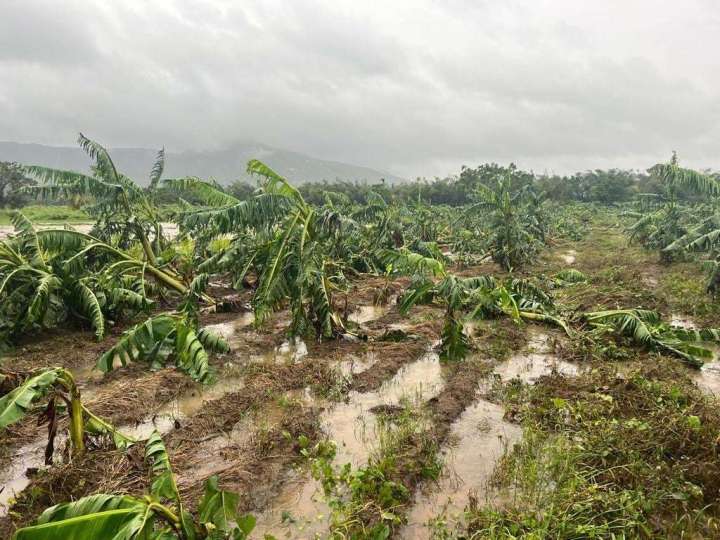As Hurricane Fiona continues to batter eastern Canada, farmers in Puerto Rico are assessing storm damage in their sodden fields.
Hurricane Fiona ravages Puerto Rican farms near peak harvest, farmers say

Ninety percent of the region’s major crop, plantains, has been lost due to the wind and torrential rains, said Antonio Sanchez, the association’s administrator. He estimates there are around 700 acres of plantains in the area, farmed by about a dozen growers.
“Most of the lowlands were flooded,” he said. “We had close to 18 inches of water in the valley.”
One potential piece of good news is that many plants that were bent sideways by the wind still have fruit attached. Those can still be harvested and taken to market, according to Salvador Coleman, a farmer in the region, but only if farmers have the machinery to clear pathways, harvest salvageable fruit, and then get it there.
Also battered by the storm were crops developed under a broader diversification push in the five years since Hurricane Maria. In an area once known for export crops like sugar cane, tobacco and coffee, farmers began growing pumpkin, eggplant, sweet potato and sweet peppers, largely for domestic consumption. Those took a heavy hit, said Elvin Lebrón of the Eastern Soil and Water Conservation District.
There’s an additional issue of underinsurance. Of Puerto Rico’s nearly 9,000 farms, most qualify as small farms that generate less than $10,000 in annual revenue, according to recent census data. And many of those small farmers, especially those with diversified crops, do not qualify for crop insurance, Sanchez said. They will be left with little to no income this season, said Karla Peña, who works as a program manager in Puerto Rico for the nonprofit Mercy Corps.
Mercy Corps has 17 resilience hubs around the island, all providing hot meals to communities, Peña said. But if the situation continues with limited electricity and little access to potable water, the ability to continue feeding people will be diminished.
Antonio Rosa works for Cundeamor, a distributor in Guaynabo that works with a network of small and medium organic farms throughout the island, many of which are off the grid. Chef José Andrés’s World Central Kitchen in Ponce has purchased Rosa’s products this week to prevent crops from going to waste. Rosa said the south side of the island, which bore the brunt of the storm, has the largest plantain and banana farms. So its farmers stand to see the steepest losses — or gains — depending on how extensive their insurance is, he said.
“Most farmers know this is part of the risk they take when they grow food,” he said. “For some farmers this is a great opportunity to make lots of money as some of them insured their crop.”
But more broadly, the impact on ordinary Puerto Ricans will probably hurt, he said.
“With inflation, local produce was some sort of relief for our people’s pockets, because it kept prices low,” he said. “But now, this storm will increase prices for whatever agricultural products are left until things return to normal again.”
More support is expected. President Biden said Thursday that the federal government aims to pay 100 percent of the costs of Puerto Rico’s recovery from Hurricane Fiona for the next month, including debris removal, shelter for those displaced, power and water restoration, as well as food.
This kind of short-term food assistance is necessary, but it will not help farmers in the long run and it will likely drive up domestic food prices, according to farm groups.
“Farmers need business continuity support,” said Duamed Colón Carrión, president of Agro Tropical, a Puerto Rican agricultural company in Jayuya that specializes in cover crops. This support includes emergency working capital as well as aid to farm employees, most of whom have damage to their homes and psychological stress, he said.
“The most important thing is to attend the emergency,” said Coleman, the plantain farmer in Yabucoa. “But what about after that?”






